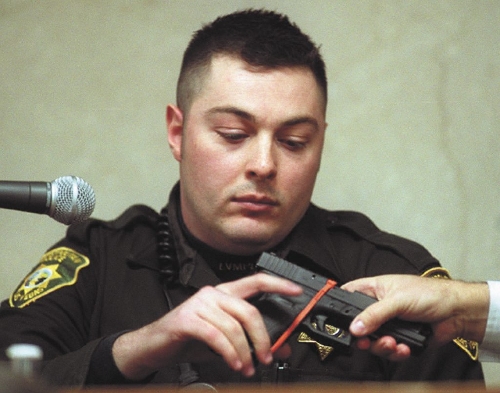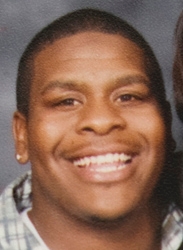Officer in Trevon Cole shooting reassigned to desk job



Bryan Yant, a narcotics detective who killed an unarmed man in a controversial 2010 shooting, has been reassigned to a desk job, a Metropolitan Police Department official said Tuesday.
Assistant Sheriff Ray Flynn said Yant had been on paid administrative leave since a June 11 drug raid led to the fatal shooting of 21-year-old Trevon Cole, a low-level marijuana dealer. Flynn said an internal investigation concluded that Yant violated several agency policies in connection with the fatal shooting.
Flynn said the most severe violations included how Yant prepared and served a search warrant in the incident. Yant also was found to have neglected his duty, Flynn said. The internal investigation also faulted Yant for violating other minor department policies.
Yant was reassigned to a desk job last weekend, Flynn said. The assistant sheriff declined to detail Yant’s new position, saying only that it involved "monitoring crime trends and significant events."
Flynn said Yant’s new job will not involve interacting with the public.
"It does not involve suspect contact," Flynn said. "It does not involve any work on the street."
Reaction to the results of the department’s internal investigation of Yant was swift and critical Tuesday evening.
Nichelle Bratton, Cole’s mother, said management with the Police Department has basically condoned Yant’s actions.
"I’m outraged," Bratton said. "I’m outraged at the fact they allowed him to come back to work. It’s disrespectful for all the good police officers out there."
Andre Lagomarsino, a lawyer representing Cole’s family, was incredulous that Yant would be allowed to continue to wear the badge.
"It just shows that if you’ve done the things Bryan Yant has done at Metro, you get to stay with Metro."
Yant, hired by Las Vegas police in September 2000, has been involved in three controversial shootings resulting in two deaths.
Lagomarsino said he will soon file a civil wrongful death lawsuit against Las Vegas police and Yant.
Flynn said he couldn’t comment on the specifics of the disciplinary actions handed down in Yant’s case, saying only that "he received discipline below the level of termination."
In August, a Clark County coroner’s inquest jury deliberated for 90 minutes before finding that Yant’s actions in Cole’s shooting were justified.
Yant told the jury he feared for his life when Cole raised his hands in a shooting stance during a nighttime drug raid on Bonanza Road near Eastern Avenue.
That night, Yant and a six-member narcotics unit conducted the raid. Yant testified that he kicked open the bathroom door during the raid and saw Cole squatting in front of the toilet. The flashlight of Yant’s AR-15 rifle had just failed, but he said there was enough light in the darkened bathroom to see Cole and his actions.
Yant said Cole, who weighed almost 300 pounds, rose to his feet while moving his hands forward in a shooting motion.
"Unfortunately he made an aggressive act toward me. He made me do my job," Yant testified at the inquest.
After Cole was shot, he was found clutching a yellow tube of lip balm in his left hand. Police found no gun in the bathroom or apartment.
A baggie was found next to Cole’s body, and bits of marijuana were floating in the toilet, according to police.
During the inquest, Assistant District Attorney Chris Owens noted that the evidence — such as the position of Cole’s body, the downward angle of the bullet through his cheek to his neck, and testimony from fellow officers who did not hear both a door being kicked and a gunshot — pointed toward an accidental discharge simultaneous with the door kick.
The inquest also examined other problematic aspects of Yant’s police work in the Cole case.
Yant’s affidavit said Cole had a history of drug trafficking.
Despite having a copy of Cole’s California driver’s license complete with a physical description and date of birth, Yant confused Cole with a Trevon Cole from Houston and California, who was seven years older, and at least 3 inches shorter and 100 pounds lighter.
Cole’s fiancée, Sequioa Pearce, who was nine months pregnant with Cole’s daughter at the time, hid in a closet during the raid.
According to a search warrant affidavit, Cole, in four transactions during a five-week period, sold $840 worth of marijuana to undercover police. The marijuana totaled 1.8 ounces and led to the drug raid at Cole’s apartment.
Yant’s supervisor at the time of the raid, Sgt. John Harney, also was the subject of an internal investigation. That investigation has concluded, but no decisions about discipline have been made, Flynn said.
Flynn added that the department’s Use of Force Board cleared Yant in the Cole shooting, but he didn’t know details of the decision.
When convened, the Use of Force Board is made up of four civilians with no ties to Las Vegas police and three members of the Police Department. They include an at-large captain who does not supervise the officer under review, the training captain, and a peer of the same rank who does not work with the officer in question.
The four citizens are randomly selected from a pool of people trained to be on the board. The board can recommend discipline against the officer ranging from written reprimand to termination.
The board’s review is not considered a public process and is standard after officer-involved shootings.
Cole’s fatal shooting was the third time Yant had used his weapon while on duty.
During a 2002 inquest into a fatal shooting of a robbery suspect, Yant’s statements contradicted evidence.
Yant said he was chasing Richard Travis Brown, dubbed "The Candy Bar Robber" by police for his 41 heists, in the early morning of Nov. 17, 2001.
After a vehicle pursuit, Yant chased Brown on foot. Yant told the inquest jury that Brown reached for a gun as the two ran down a sidewalk. Yant fired three to four rounds. Brown fell, face first.
The officer continued to yell commands at Brown, who was on the ground, to drop his gun. Yant said Brown then tried to aim the gun at him. Yant fired another three to four rounds, killing Brown. However, crime scene analysts recovered Brown’s handgun on the sidewalk, 35 feet away from where he had been shot.
How the gun wound up 35 feet away from Brown was never explored during the inquest. The jury took half an hour to find the shooting justified.
Yant also was involved in a Dec. 5, 2003, shooting in Country Club Hills, a Summerlin subdivision.
He was investigating a prowler in the neighborhood before dawn. When Yant spotted the prowler, identified as Melvin Gilchrist, police said the man charged Yant and threw a butcher knife and an aluminum baseball bat at him. Police said Yant could not see the bat clearly and mistook it for a shotgun.
Gilchrist was shot in the hip and survived. He later pleaded guilty to resisting an officer with a deadly weapon.
Maggie McLetchie, legal director with the American Civil Liberties Union of Nevada, said Yant’s sloppy work on Cole’s search warrant amounts to "extreme violations." She said that because of Yant’s history in other questionable officer-involved shootings, she would expect Las Vegas police to be more transparent in their investigation of him and disclose why and how he was disciplined.
McLetchie said the public should be concerned about interacting with Yant. "The public wants to know whether he’ll ever be allowed back on the street and under what circumstances."
Contact reporter Antonio Planas at aplanas@ reviewjournal.com or 702-383-4638.












